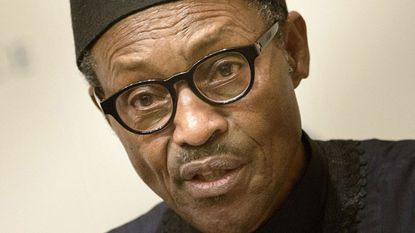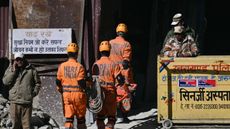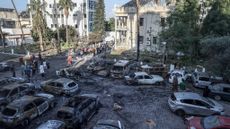Is Muhammadu Buhari winning the war against Boko Haram?
Nigerian army frees more women and children held captive by the Islamist group, but the fight is far from over

The Nigerian military says it has rescued more than 178 captives from Boko Haram camps in the north of the country, the majority of them women and children.
A Boko Haram commander was also detained and several militant camps were captured during the mission near the town of Bama, according to an army spokesperson.
President Muhammadu Buhari, a former military leader, was elected earlier this year after criticising his predecessor Goodluck Jonathan's response to the crisis and vowing to crush the Islamist insurgency.
Subscribe to The Week
Escape your echo chamber. Get the facts behind the news, plus analysis from multiple perspectives.

Sign up for The Week's Free Newsletters
From our morning news briefing to a weekly Good News Newsletter, get the best of The Week delivered directly to your inbox.
From our morning news briefing to a weekly Good News Newsletter, get the best of The Week delivered directly to your inbox.
Despite having the largest army in West Africa, Nigeria's military has struggled to push back the militants in recent years. Successful rescue missions carried out this year suggest it might be turning a corner, but the fight against extremism is far from over.
Is Buhari's army winning?
The Nigerian army has claimed a number of significant victories in the past few months, reclaiming several towns in the north-east previously held my militants and freeing hundreds of captives. Buhari argues that the formation of a stronger regional coalition with Cameroon, Chad and Niger will lead to the elimination of Boko Haram. However, Reuters points out that the multinational task force has been "dogged by a lack of funding and political will" and suffered numerous delays.
Despite these successes, there has been no let-up in the terrorist attacks targeting civilians, particularly suicide bombings and guns attacks on soft targets like market places, churches and schools. Troops have also been unable to locate the hundreds of schoolgirls captured in Chibok last year and abductions still occur.
The group's leadership also remains intact, which means Boko Haram "may continue to possess the acumen to replenish, regroup, and rearm both within and outside of Nigeria's borders," warned Ryan Cummings, Chief Africa Analyst for the risk management firm Red24.
What next?
Buhari has not ruled out the option of entering into peace talks with the militants. "If Boko Haram opts for negotiation the government will not be averse to it," his spokesperson told Bloomberg last month. But he added that the administration would "not be negotiating from a position of weakness, but that of strength".
Analysts also point out that the battle against the insurgents is not simply a military one. "Until factors like poverty, unemployment and lack of education can be addressed, local populations will remain vulnerable to extremist ideology," says the BBC.
Max Siollun, a Nigerian historian and author, also highlights the urgent need for the rescued women and children – many of whom have fathered children by the militants – to be given rehabilitation and support once they return to their communities. "The conflict is entering a phase where it needs to be fought not just with bombs and guns, but also by addressing the consequences of the insurgency," he writes in The Guardian.
Create an account with the same email registered to your subscription to unlock access.
Sign up for Today's Best Articles in your inbox
A free daily email with the biggest news stories of the day – and the best features from TheWeek.com
-
 Today's political cartoons - April 14, 2024
Today's political cartoons - April 14, 2024Cartoons Sunday's cartoons - Trump Derangement Syndrome, social media dangers, and more
By The Week US Published
-
 5 rambunctious cartoons about the House speakership standoff
5 rambunctious cartoons about the House speakership standoffCartoons Artists take on Mike Johnson's night terrors, the Speaker's chair, and more
By The Week US Published
-
 The Week Unwrapped: Ultrarunning, menswear and a meaty row
The Week Unwrapped: Ultrarunning, menswear and a meaty rowPodcast Is the "Hardest Geezer" a high-endurance trendsetter? Will Ted Baker survive? And what's the beef with lab-grown meat?
By The Week Staff Published
-
 Puffed rice and yoga: inside the collapsed tunnel where Indian workers await rescue
Puffed rice and yoga: inside the collapsed tunnel where Indian workers await rescueSpeed Read Workers trapped in collapsed tunnel are suffering from dysentery and anxiety over their rescue
By Sorcha Bradley, The Week UK Published
-
 Gaza hospital blast: What the video evidence shows about who's to blame
Gaza hospital blast: What the video evidence shows about who's to blameSpeed Read Nobody wants to take responsibility for the deadly explosion in the courtyard of Gaza's al-Ahli Hospital. Roll the tape.
By Peter Weber, The Week US Published
-
 Giraffe poo seized after woman wanted to use it to make a necklace
Giraffe poo seized after woman wanted to use it to make a necklaceTall Tales And other stories from the stranger side of life
By Chas Newkey-Burden, The Week UK Published
-
 Helicopter sound arouses crocodiles
Helicopter sound arouses crocodilesTall Tales And other stories from the stranger side of life
By Chas Newkey-Burden, The Week UK Published
-
 Woman sues Disney over 'injurious wedgie'
Woman sues Disney over 'injurious wedgie'Tall Tales And other stories from the stranger side of life
By Chas Newkey-Burden, The Week UK Published
-
 Emotional support alligator turned away from baseball stadium
Emotional support alligator turned away from baseball stadiumTall Tales And other stories from the stranger side of life
By Chas Newkey-Burden, The Week UK Published
-
 Europe's oldest shoes found in Spanish caves
Europe's oldest shoes found in Spanish cavesTall Tales And other stories from the stranger side of life
By Chas Newkey-Burden, The Week UK Published
-
 Artworks stolen by Nazis returned to heirs of cabaret performer
Artworks stolen by Nazis returned to heirs of cabaret performerIt wasn't all bad Good news stories from the past seven days
By The Week Staff Published